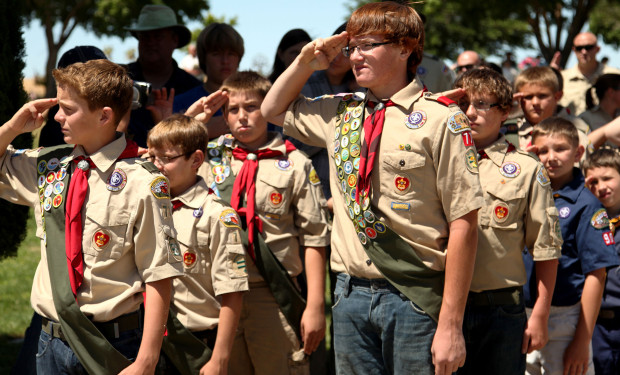Is a Scout’s Honor Enough?
The California Judicial bar is proposing an amendment which would effectively prohibit Judges from being members of the Boy Scouts of America.
 Scouts from Boy Scout Pack 77 salute the American flag during a Memorial Day ceremony at Joushua Tree Memorial Park May 28, 2012. (Official USMC photo by Lance Cpl. Lauren A. Kurkimilis) (Wikimedia Commons)
Scouts from Boy Scout Pack 77 salute the American flag during a Memorial Day ceremony at Joushua Tree Memorial Park May 28, 2012. (Official USMC photo by Lance Cpl. Lauren A. Kurkimilis) (Wikimedia Commons)
Editor’s Note: This article is the first in a two-part series discussing judicial membership in the Boy Scouts of America. Part Two can be found here.
The Scout Law requires that each scout must be trustworthy, loyal, helpful, friendly, courteous, kind, obedient, cheerful, thrifty, brave, clean and reverent. Yet, these strict standards are not stringent enough for the Supreme Court of California’s Advisory Committee of the Code of Judicial Ethics. On February 5, 2014 the Committee proposed an amendment to the California Code of Judicial Ethics which would effectively prohibit judges in the state from being members of the Boy Scouts of America. The amendment is based on the fact that although Boy Scouts do allow homosexual youth members, they still prohibit open homosexual adults from being Boy Scout leaders or scoutmasters.
Currently Canon 2C of the Code of Judicial Ethics prohibits judges from being members in organizations that practice invidious discrimination on the basis of race, sex, gender, religion, national origin, ethnicity, or sexual orientation. This prohibition excludes religious organizations, the military, and nonprofit youth organizations. Forty-seven states prevent judges from being members of discriminatory groups and twenty-two of those states include sexual orientation as a prohibited discriminatory purpose. The commentary to Canon 2C provides that prohibiting judges from being members in organizations that practice invidious discrimination prevents the any public perception that a judges impartiality will be impaired.
This proposed change is specifically aimed at the Scouts and the group is even named in the amendment.
First, the Advisory Committee’s proposed amendment would remove the exception for membership in military organizations due to the lack of need for the exception. The committee purports that the exception is no longer needed because the military has lifted restrictions on homosexual individuals in the military.
Second, the amendment would also eliminate the nonprofit youth organization exception. The committee justifies the removal of this exception stating that no other states have this exception and allowing judicial officials to participate in organizations that practice invidious discrimination is inconsistent with the other canons. This proposed change is specifically aimed at the Scouts and the group is even named in the amendment. The committee argues that because the Scouts do not allow homosexuals to be leaders in their organization, many homosexuals who come before judges who are members of the Scouts may feel as if they will not get a fair trial.
This is not the first time that this issue has come before the Advisory Committee. The Committee proposed removing the exception in 2003, though the Supreme Court of California ultimately decided to keep the exception after numerous communications from judges and lawyers.
It is a shame that these young men may miss out on the leadership and guidance from judges, those individuals in our society that we respect so much as to appoint or elect them to the bench.
In 2000 the Boy Scouts won the U.S. Supreme Court case Boy Scouts of America v. James Dale. In that case an Assistant Scoutmaster was removed from his position in the organization after he came out as a homosexual. The Supreme Court found that to prohibit the Boy Scouts from expelling Dale as a member was a violation of the Scouts’ First Amendment rights. This was based on the position of the Scouts that homosexuality was inconsistent with their values as a whole. Thus, although the Scouts and other organizations are still permitted to choose who may join their membership, if their policies go too far judges in many states may not be permitted to participate.
The Boy Scouts provide great learning experiences to many young men, many of whom would not have these opportunities otherwise. Scouting teaches young boys many essential life lessons and values that any individual should aspire for, based on the twelve tenants of the Scout Law. It is a shame that these young men may miss out on the leadership and guidance from judges, those individuals in our society that we respect so much as to appoint or elect them to the bench. Whether or not the Supreme Court of California approves this amendment or the Boy Scouts changes its policy, this is an issue which will likely be heard in many more states.





